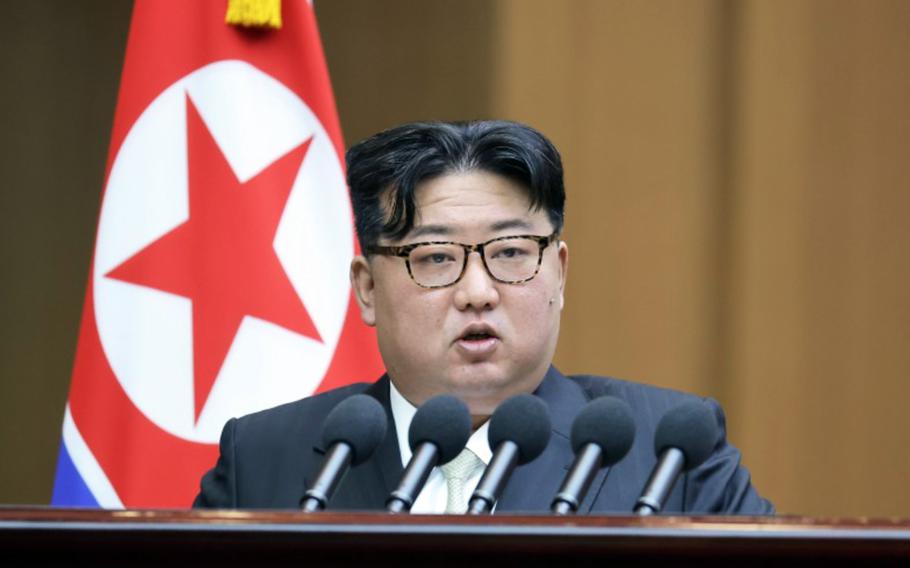
North Korean leader Kim Jong Un speaks during the Supreme People's Assembly in Pyongyang, Monday, Jan. 15, 2024. (KCNA)
CAMP HUMPHREYS, South Korea — North Korea ought to amend its constitution to state that its forces will “completely occupy” the South if war breaks out on the peninsula, leader Kim Jong Un said in a speech Monday.
Speaking at the Supreme People’s Assembly in Pyongyang, Kim said a constitutional revision is necessary to identify the North’s “territorial sphere” and that the South should be occupied and annexed during a war, the state-run Korean Central News Agency reported the next day.
The constitution should also remove references to a goal of peacefully reunifying the peninsula due the South being a “primary foe,” the report said.
Kim reportedly also suggested blocking its communication lines with the South and destroying a defunct inter-Korean railway linking Seoul with the North’s border town of Sinuiju.
The proposals are not meant to signal a preemptive North Korean attack or the forceful reunification of the Koreas but is the exercise of the “legitimate self-defense” capabilities of Pyongyang, the KCNA report added.
“The war will terribly destroy the entity called the Republic of Korea and put an end to its existence,” the report said, referring to South Korea’s official name. “And it will inflict an unimaginably crushing defeat upon the [United States].”
South Korean President Yoon Suk Yeol during a cabinet meeting Monday addressed KCNA’s report and said Pyongyang’s threats are no longer effective against Seoul.
“If North Korea provokes us, we will punish them several times over,” Yoon said.
Kim’s remarks came a day after North Korea fired an intermediate-range ballistic missile, the first such launch by the regime this year. It was launched near the capital at 2:55 p.m. and flew about 620 miles before splashing down in the Sea of Japan, or East Sea, according to the South’s military.
Nearly a month earlier, North Korea fired its solid-fueled Hwasong-18, an intercontinental ballistic missile theoretically capable of reaching the continental U.S.
The North also fired roughly 350 artillery shells toward the maritime border with the South over a three-day span starting Jan. 5. South Korean marines stationed on islands near the border responded by firing 155 mm howitzers and tank rounds into the Yellow Sea.
Ties between North and South Korea have frayed since November after the two countries abandoned a military deconfliction agreement that prohibited armed troops at the border and established no-fly zones.
South Korea partially suspended the agreement after the North successfully launched a spy satellite on Nov. 21; the suspension prompted North Korea to scrap the agreement entirely the next day.
North Korean troops have since been spotted by the South’s military restoring once-abandoned guard posts near the border. Meanwhile, U.N. Command guards stationed at the Joint Security Area have been reauthorized to carry firearms.